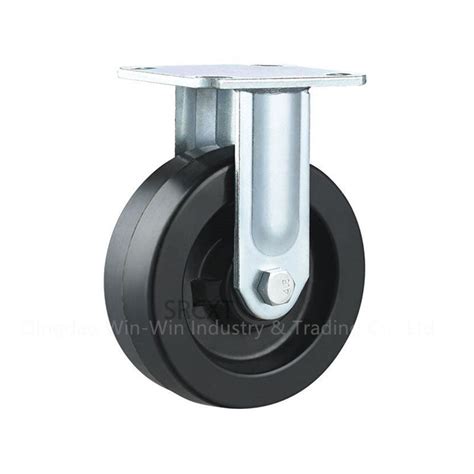Caster wheels, the unsung heroes of mobility, play a crucial role in a wide range of applications, from industrial machinery to office furniture. Choosing the right caster wheels is paramount for ensuring smooth operation, durability, and safety. Among the various materials available, metal caster wheels stand out as a reliable and versatile option.

Advantages of Metal Caster Wheels
1. Enhanced Durability: Metal, particularly steel, is renowned for its exceptional strength and resistance to wear and tear. Metal caster wheels can withstand heavy loads, harsh environments, and frequent use without compromising their integrity.
2. Superior Load-Bearing Capacity: Metal caster wheels boast a high load-bearing capacity, making them suitable for heavy-duty applications. They can support weights ranging from a few hundred pounds to several tons, depending on the caster’s design and construction.
3. Resistance to Corrosion and Chemicals: Metal caster wheels are resistant to corrosion and chemical damage, making them ideal for use in corrosive environments such as factories, chemical plants, and outdoor areas. They can withstand exposure to acids, alkalis, and other harsh chemicals without deteriorating.
4. Adaptability to Diverse Applications: Metal caster wheels find applications in a wide range of industries, including manufacturing, healthcare, logistics, and retail. They can be used for carts, dollies, machinery, and other equipment that requires mobility and durability.
Types of Metal Caster Wheels
Metal caster wheels come in various types to meet specific application requirements.
1. Steel Caster Wheels: Steel caster wheels offer the highest strength and durability, making them suitable for heavy-duty applications and harsh environments.
2. Aluminum Caster Wheels: Aluminum caster wheels combine strength and lightness, making them ideal for applications where weight reduction is crucial, such as aircraft and medical equipment.
3. Stainless Steel Caster Wheels: Stainless steel caster wheels provide excellent corrosion resistance and hygiene, making them suitable for food handling, medical facilities, and other sensitive environments.
Applications of Metal Caster Wheels
Metal caster wheels have an expansive range of applications, spanning multiple industries and sectors.
1. Industrial: Heavy-duty metal caster wheels are used in factories, warehouses, and other industrial facilities for moving heavy equipment, materials, and machinery.
2. Healthcare: Aluminum and stainless steel caster wheels are used in hospitals, medical clinics, and nursing homes for beds, medical equipment, and patient mobility devices.
3. Logistics: Steel caster wheels are widely used in warehouses, distribution centers, and logistics operations for carts, dollies, and forklifts.
4. Retail: Aluminum and steel caster wheels find applications in retail stores, shopping malls, and exhibition halls for display fixtures, equipment, and merchandising carts.
Market Trends and Statistics
According to a report by Grand View Research, the global caster wheel market size was valued at USD 10.77 billion in 2020 and is projected to reach USD 17.16 billion by 2028, exhibiting a CAGR of 6.1% from 2021 to 2028. The increasing demand for caster wheels in various industries, such as manufacturing, healthcare, and logistics, is driving market growth.
Tips and Tricks for Using Metal Caster Wheels
- Choose the Right Size: Determine the weight and size of the load to be handled and select caster wheels with an appropriate load-bearing capacity.
- Consider the Environment: Assess the operating environment and select caster wheels with the appropriate corrosion resistance and chemical durability.
- Lubricate Regularly: Periodically lubricate the bearings and swivels of metal caster wheels to ensure smooth operation and extend their service life.
- Inspect Regularly: Inspect caster wheels regularly for signs of wear and damage, and promptly replace any defective ones to prevent accidents.
Pros and Cons of Metal Caster Wheels
Pros:
- Exceptional durability and strength
- High load-bearing capacity
- Corrosion and chemical resistance
- Suitable for diverse applications
Cons:
- Heavier than other materials
- May not be suitable for all applications due to weight considerations
FAQs
-
What is the difference between swivel and rigid caster wheels?
* Swivel caster wheels allow the wheel to rotate freely in any direction, providing excellent maneuverability. Rigid caster wheels are fixed in a specific direction, providing more stability. -
How do I choose the right caster wheels for my application?
* Consider factors such as load weight, operating environment, and frequency of use. Consult with a reputable caster wheel manufacturer for expert advice. -
How can I extend the lifespan of my caster wheels?
* Lubricate them regularly, inspect them periodically, and replace them when necessary. Avoid overloading and protect them from excessive shock and wear. -
What are some innovative applications for metal caster wheels?
* “Mobolize” furniture with caster wheels to create flexible and adaptable spaces. Use caster wheels on portable workbenches to enhance project mobility. -
What is the best way to clean metal caster wheels?
* Use a damp cloth and mild detergent to wipe away dirt and debris. Avoid using harsh chemicals or abrasive cleaners that could damage the finish. -
How often should I replace metal caster wheels?
* Replace caster wheels when they show signs of excessive wear, such as cracked or broken wheels, worn bearings, or loose swivels. Regular inspection and maintenance can help extend their lifespan.
